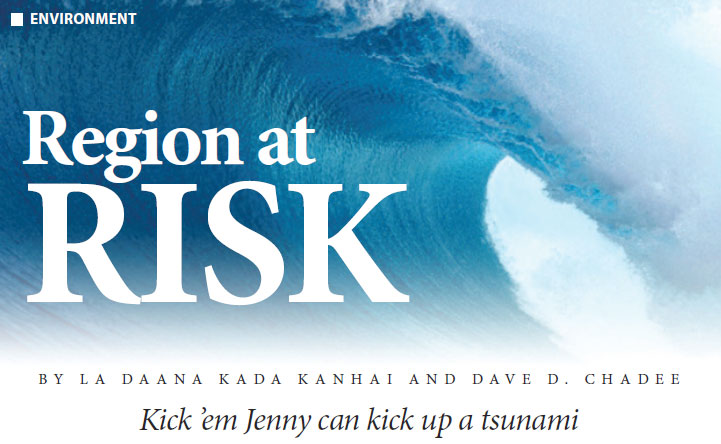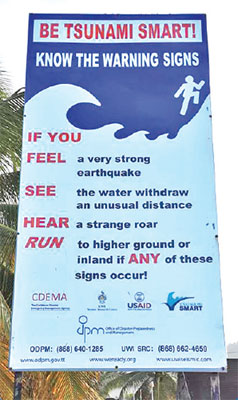
From 1498 to now, 85 to 106 tsunamis were reported the Caribbean. The most devastating was the 1946 tsunami in the Dominican Republic which resulted in the loss of 1800 lives. The 2010 Haiti earthquake resulted in a tsunami which caused at least three fatalities. Trinidad and Tobago experienced tsunamis/‘tsunami-like’ events in 1795, 1825, 1831, 1991 and 1997.
Is it likely that T&T will be subject to a future tsunami? It is likely and may be caused by the eruption of Kick ’em Jenny (an underwater volcano located off Grenada) or earthquakes. Such a scenario ought to generate concern as a significant percentage of T&T’s 1.3 million inhabitants live in low-lying coastal areas around both islands; many locals and tourists visit the country’s beaches for recreation, and coastal infrastructure exists on both islands.
In T&T, the three organisations which are involved in tsunami awareness and preparedness are the Seismic Research Unit (SRC), the Office of Disaster Preparedness and Management (ODPM), and the Tobago Environmental Management Agency (TEMA).
Although local agencies have conducted work regarding tsunami awareness and preparedness, this does not automatically imply that as a country we are prepared to deal with such an event. In order to provide some quantitative information regarding this issue, a knowledge, attitude and practice (KAP) survey (Kanhai et al. 2016) was used to gather information from locals in communities deemed vulnerable to potential tsunamis (those located on land less than 10 metres in height).
Knowledge, attitude and practice (KAP) surveys are tools which have been used to investigate what people know, how they feel and what they practice regarding a specific topic. The findings from such surveys can be used to evaluate the effectiveness of existing programmes and inform the implementation of appropriate interventions regarding a specific issue. The KAP survey technique was therefore utilised in our study to assess the knowledge, attitude and practices of coastal communities in Trinidad and Tobago about tsunamis.
A total of 350 persons were interviewed using a targeted questionnaire in seven coastal communities across Trinidad (Maracas, Grand l’Anse, Mayaro) and Tobago (Buccoo, Charlotteville, Speyside, Roxborough).
The main findings of our study were that there was an overall lack of awareness about tsunamis. Fewer than 20% of interviewees were fully aware of a basic definition of a tsunami. Only 57% indicated that it was possible to foretell a tsunami’s arrival based on signs in the natural environment. Although interviewees were aware of tsunamis that had occurred in other parts of the world, 92% were unaware that tsunamis had occurred in the Caribbean in the past. There was also an overall lack of preparedness by the interviewees as the majority (93%) indicated that their family did not have an emergency plan for a tsunami. Despite the fact that local agencies had previously conducted tsunami awareness activities, 80% of all interviewees indicated that public education programmes had never been conducted in their community. Furthermore, at least 46% of interviewees indicated that there was no/little likelihood that a tsunami would hit Trinidad and Tobago within the next ten years. If a tsunami were to hit the country, 57% of interviewees indicated that God would be the entity that would most likely prevent the loss of life.
 In the Caribbean, the arrival time for a tsunami caused by local or regional sources is predicted to be short: less than 30 minutes to an hour. It is therefore critically important that locals (especially those living in vulnerable communities) possess basic tsunami awareness that will enable them to take appropriate action (initiate self evacuation and move to higher ground) if a tsunami is coming. In the Caribbean, the arrival time for a tsunami caused by local or regional sources is predicted to be short: less than 30 minutes to an hour. It is therefore critically important that locals (especially those living in vulnerable communities) possess basic tsunami awareness that will enable them to take appropriate action (initiate self evacuation and move to higher ground) if a tsunami is coming.
The findings of our study indicate that in spite of the work by local authorities in T&T in relation to tsunami awareness and preparedness, it is apparent that there is still much to be done.
For more information on the study that was conducted, interested persons may refer to: Kanhai, La Daana K., Delezia Singh, Bruce Lauckner, Kristie L. Ebi, and Dave D. Chadee. 2016. "Knowledge, attitude and practices of coastal communities in Trinidad and Tobago about tsunamis." Natural Hazards 81 (2):1349-1372. doi: 10.1007/s11069-015-2138-3.
TSUNAMI AWARENESS
In order to build awareness and preparedness amongst the local population regarding tsunamis, some measures that may be taken are:
(i) development of a national plan of action regarding this natural hazard,
(ii) inclusion of the topic of tsunamis on the primary and secondary school syllabi,
(iii) delivery of tsunami awareness presentations to all primary/secondary schools and key stakeholders located in coastal communities,
(iv) installation of warning systems in all vulnerable coastal communities, and
(v) use of the media to raise tsunami awareness amongst locals. |





